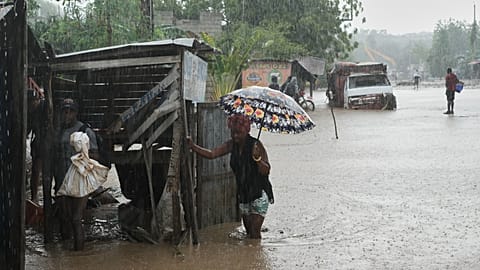A new study has assessed the growing toll of climate change on human health.
Climate change can have an impact on people’s lives, health, and livelihoods. And when governments around the world fail to act, millions are affected.
A new study, published by The Lancet, looks at how these “delays in adaptation” exacerbate the effects of climate change on the planet and humans.
“The mitigation of climate greenhouse gases is not globally as swift and as rapidly progressing as what is needed to meet the goals of the Paris Agreement,” Joacim Rocklöv, Co-Director of the Lancet Countdown Europe Centre, told Euronews.
An annual report on climate and health
The Lancet Countdown is a multinational collaboration that looks at the relationship between climate change and health, including metrics on deaths from extreme heat and wildfire smoke, the coverage of urban blue spaces (rivers, lakes, and coastlines), health adaptation funding and individual engagement with health and climate change.
“There is a need to actually communicate and track progress on health specifically, because it's such a fundamentally important part of the impacts of climate change and it’s rarely discussed,” says Rocklöv.
Of 20 different indicators tracking health threats, 13 have now reached unprecedented levels.
Failure to curb the warming effects of climate change has seen the rate of heat-related deaths surge 23 per cent since the 1990s, reaching 546,000 a year. Last year was the hottest year on record, with catastrophic consequences. Worldwide, the average person was exposed to a record extra 16 health-threatening hot days as a result of climate change - a 389 per cent increase from the 1986 to 2005 yearly average. The most vulnerable (those under 1 year old and over 65) experienced, on average, an all-time high of 20 heatwave days - a 304 per cent increase.
Hotter, drier conditions are also fuelling conditions for wildfires. In 2024 alone, fine particle air pollution from wildfire smoke was linked to a record 154,000 deaths. Droughts and heatwaves also increased the number of people experiencing moderate or severe food insecurity by 123 million in 2023, compared to the annual average between 1981 and 2010.
The report also highlights that 2.5 million deaths every year are attributable to air pollution from fossil fuel burning.
Dr Marina Romanello, executive director of the Lancet Countdown at University College London, said in a press release that this year’s stocktake “paints a bleak and undeniable picture”.
“The destruction to lives and livelihoods will continue to escalate until we end our fossil fuel addiction and dramatically up our game to adapt.”
How is Europe impacted?
The effects of climate inaction are especially evident in Europe. The continent is warming twice as fast as the global average. According to the report, with climate change, the average number of heatwave days in Europe will more than triple.
This heat can be dangerous and fatal for certain European populations.
“Especially south Europe and in places where you have demographic and epidemiological transition with more elderly, a high degree of elderly and people with pre-existing diseases, you see how the mortality rates are increasing quite substantially due to this change,” says Rocklöv.
High temperatures can also increase the spread of infectious diseases, such as Chikungunya and dengue.
European infrastructure is also not well-suited for rising temperatures, especially as the “heat island effect” can intensify heatwaves in urban areas.
“A lot of cities don’t actually cope so well with heat,” Rocklöv adds. “It’s difficult to adapt.”
‘All hands on deck’
The report also gives data on how certain types of climate action will save lives. It estimates that about 160,000 lives are saved by the shift fromcoal and the resulting cleaner air. Renewable energy is also an effective avenue for a healthier environment and population.
Rocklöv emphasises the importance of individual actions that would prompt more climate action.
“[It’s important to] support policies that would aim to help us reduce our greenhouse gas emissions, make our cities healthier with less air pollution, for example, and eat healthier,” he says. A recent study in Sweden found that reducing meat consumption could reduce the climate footprint of food consumption by an equivalent of about 700,000 tonnes of carbon dioxide per year.
The Lancet study’s authors see a need for more pressure on governments to act on climate change, build more climate-adaptive cities, and reduce climate-change-associated mortalities.
“As some governments uphold an unsustainable, unhealthy and ultimately unliveable status quo, people around the world are paying the ultimate price,” Professor Anthony Costello, Co-Chair of the Lancet Countdown, says in a press release.
“ We have to build on the momentum we have seen from local action: Delivering health-protective, equitable, and just transition requires all hands on deck.”


















